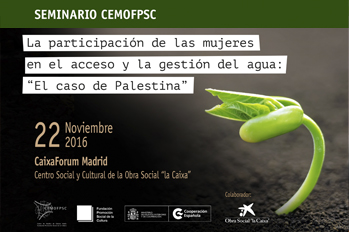
The Centre for Middle Eastern Studies of the FPSC (CEMOFPSC), in collaboration with Obra Social “la Caixa”, organized last November 22 the Seminar: “The participation of women in water access and management: the case of Palestine”. The seminar, funded by the Spanish Agency for International Cooperation for Development (AECID), was held at CaixaForum in Madrid.
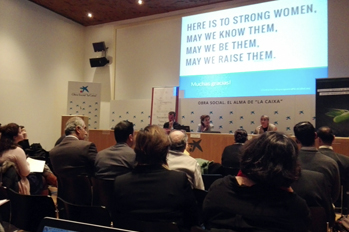
During the course of the Seminar, topics such as the human right to drinking water and sanitation in Palestine as a starting budget for sustainable development were addressed; good practices in access and water management driven by international organizations, development agencies, local public and private organizations and civil society; and the human right to water situation from the perspective of Palestinian women in the Middle East region.
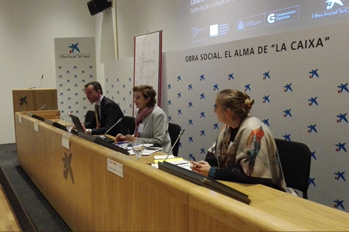 The seminar was opened by Javier Parrondo Babarro, Head of the Department of Cooperation with the Arab World and Asia of the Spanish Agency for International Development Cooperation (AECID), and Jumana Trad Younes, President of the Foundation for Social Development Culture (FPSC).
The seminar was opened by Javier Parrondo Babarro, Head of the Department of Cooperation with the Arab World and Asia of the Spanish Agency for International Development Cooperation (AECID), and Jumana Trad Younes, President of the Foundation for Social Development Culture (FPSC).
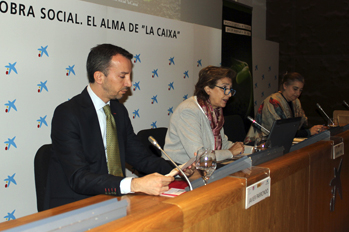 Elena López-Gunn, Founder and Director of ICATALIST, then addressed words of thanks to the person of Ramón Llamas (Fundación Botín), and referred to water as a key factor of economic development and unique economic good that it has no substitution. In addition, she emphasized the fact that women during the lactation period suffer from the quality of the water they ingest, which directly affects their lactating children. She also emphasized the gender approach, which she considers to be nuclear in this area. According to her, social infrastructures and the empowerment of women as agents of change must also be addressed. Empowerment and decision-making are key elements for women. Without empowering women, human capital and a channel for innovation is lost.
Elena López-Gunn, Founder and Director of ICATALIST, then addressed words of thanks to the person of Ramón Llamas (Fundación Botín), and referred to water as a key factor of economic development and unique economic good that it has no substitution. In addition, she emphasized the fact that women during the lactation period suffer from the quality of the water they ingest, which directly affects their lactating children. She also emphasized the gender approach, which she considers to be nuclear in this area. According to her, social infrastructures and the empowerment of women as agents of change must also be addressed. Empowerment and decision-making are key elements for women. Without empowering women, human capital and a channel for innovation is lost.
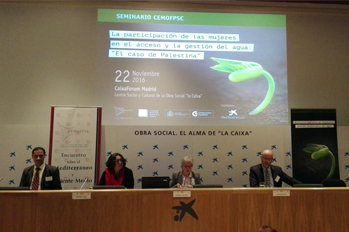 The second session focused on the “Right to water in Palestine: current situation and implementation difficulties”. In this table Amin Nawahda, Civil and Environmental Engineering (PARC) (Palestine); Fuad Bateh, Consultant on Environment and Water (Palestine); and Amira Hass, Journalist of Haaretz, (Israel) participated. The session was moderated by Isabel Casado López, Technical Advisor of the Middle East and Asia (AECID).
The second session focused on the “Right to water in Palestine: current situation and implementation difficulties”. In this table Amin Nawahda, Civil and Environmental Engineering (PARC) (Palestine); Fuad Bateh, Consultant on Environment and Water (Palestine); and Amira Hass, Journalist of Haaretz, (Israel) participated. The session was moderated by Isabel Casado López, Technical Advisor of the Middle East and Asia (AECID).
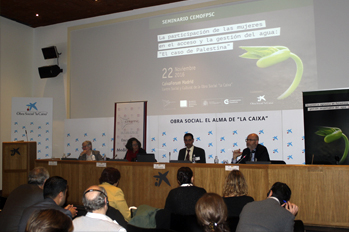 Amin Nawahda revealed the precariousness of the Palestinian wells considering the Israelis. She said that Palestine requires not only technical support, but above all a political one. She commented that agricultural development for low-income communities in Palestine are an objective of the projects implemented by PARC with the FPSC, and that they promote the participation of active social actors, such as women’s cooperatives.
Amin Nawahda revealed the precariousness of the Palestinian wells considering the Israelis. She said that Palestine requires not only technical support, but above all a political one. She commented that agricultural development for low-income communities in Palestine are an objective of the projects implemented by PARC with the FPSC, and that they promote the participation of active social actors, such as women’s cooperatives.
For his part, Fuad Bateh noted that water resources are shared by Israel and Palestine in all cases, but that the Israelis exploit 90% of them. He said that Israel controls any decision on water projects; its control is absolute.
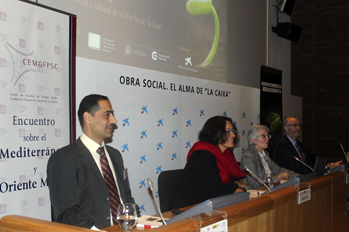 Next, Amira Hass intervened, considering that in this area the Palestinian people suffer an offence. She said that every Israeli ruler lies in relation to water. In textual terms “Palestinians have no right to water flowing under their feet.”
Next, Amira Hass intervened, considering that in this area the Palestinian people suffer an offence. She said that every Israeli ruler lies in relation to water. In textual terms “Palestinians have no right to water flowing under their feet.”
In response to the public’s question about what is behind Israeli policy in this area, Hass indicated that she can only talk about what she perceives on the ground. The Palestinians can not plan, there is no development, and Israel’s goal is to fragment Palestinian territory.
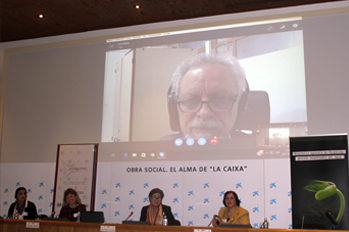 The third session “Access to and management of water in Palestine: examples of good practice” included the participation, via skype, of Leo Heller, United Nations Special Rapporteur on the human rights to water and sanitation of the Office of the High Commissioner for UN for Human Rights (OHCHR); Randa Siniora, Director General of the Women’s Centre for Legal Aid and Counselling (WCLAC) (Palestine); Yara Zayed, Director of Deem Company for Collective Development (Palestine); and Miriam T. Ramos Méndez (Gender Focal Point WASH Cluster) (GVC – Italy) from Palestine. Macarena Cotelo, Project Director of the FPSC moderated the session.
The third session “Access to and management of water in Palestine: examples of good practice” included the participation, via skype, of Leo Heller, United Nations Special Rapporteur on the human rights to water and sanitation of the Office of the High Commissioner for UN for Human Rights (OHCHR); Randa Siniora, Director General of the Women’s Centre for Legal Aid and Counselling (WCLAC) (Palestine); Yara Zayed, Director of Deem Company for Collective Development (Palestine); and Miriam T. Ramos Méndez (Gender Focal Point WASH Cluster) (GVC – Italy) from Palestine. Macarena Cotelo, Project Director of the FPSC moderated the session.
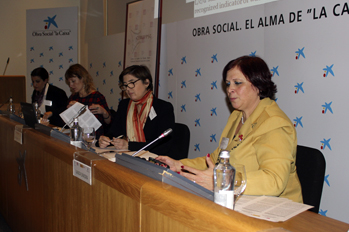 Leo Heller warned of the impact that access to water and sanitation exerts especially on women and girls. He gave as an example the function they assume in many places of collection and transportation of water to the home, supporting big weighs, and unpaid, which generates inequality. During his speech, he highlighted the difficulty of access to sanitation in decent conditions, a situation that is especially acute for young women.
Leo Heller warned of the impact that access to water and sanitation exerts especially on women and girls. He gave as an example the function they assume in many places of collection and transportation of water to the home, supporting big weighs, and unpaid, which generates inequality. During his speech, he highlighted the difficulty of access to sanitation in decent conditions, a situation that is especially acute for young women.
It is imperative, he stressed, to promote laws and policies that take into account gender equality in water and sanitation.
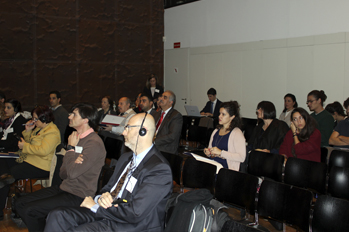 Randa Siniora, in her speech, stressed that only 11% of women in Palestine participate in decision-making.
Randa Siniora, in her speech, stressed that only 11% of women in Palestine participate in decision-making.
During her speech, Yara Zayed explained the difficulty in the decision-making of Palestinian women at the domestic level, where due to cultural factors they are contingent on the approval of the male. According to her, there is a lack of awareness in water management and gender issues among institutions in Palestine, including among women themselves.
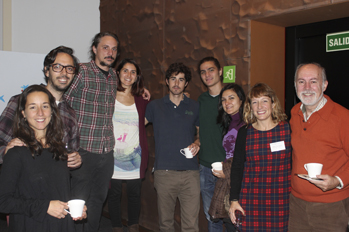 Miriam T. Ramos gave a presentation on the toolkit being developed to carry out a gender mainstream on the concept of water (WASH).
Miriam T. Ramos gave a presentation on the toolkit being developed to carry out a gender mainstream on the concept of water (WASH).
He noted that during the process of identifying needs in the field by NGOs, are not taken into account the different roles of men and women.
Finally, Diego Molina, FPSC Project Technician, presented the main conclusions of the seminar, prior to its closure by Jumana Trad.

